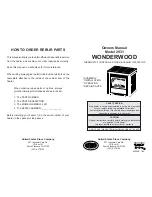
CHIMNEY INFORMATIONS
•
Before the hook up of the stove, check if the chimney is in good condition and that the quality of the
flue will allow a sufficient draught. For a good combustion, refer to the technical data of the stove
to know the minimum draught required.
•
Factory built a type chimney or L type chimney are approved for this unit. The chimney has to be
well insulated, a chimney to cold can affect the gas temperature and lower draught effects. Low
gases T
o
will tend to condense and freeze or leak in your chimney.
•
5" factory built chimney is required. Using a larger flue tend to expand combustion gas and cools
them off witch has for result of lowering the draught effects. Gas expansion reduces the speed of
the draught and have the same effects.
•
When the unit is installed on a masonry chimney witch is often oversize, it’s required to use a
stainless steel liner of 5" diameter inside the existing chimney. ref : B-139 4.2.2.6 standard
•
The chimney has to reach a minimum of 15' high (including stove pipes). The chimney has to
extend not less than 3' above the point it exits the roof and 2' higher than any roof, building other
obstacle within a horizontal distance of 10'. ref.: standard B-139 - 4.2.2.11.
•
CHEMNEY MINMUM HEIGHT :
Height of chemney should inferior than 15’
(4.6 m).
Figure 4:
CHEMNEY MINMUM HEIGHT
•
CLEARANCES WITH ROOF SUMMIT AND
BUILDING NEARBY :
The chimney flue shall extend at least 2’ (0,6
m) above the highest roof surface or
structure within 10’ (3,0 m) horizontally of
the chimney. ref.: standard B-139 - 4.2.2.11
Figure 5:
CHIMNEY CLEARANCES
•
CLEARANCE FROM ROOFING INTERSECTION :
The chimney flue shall extend at least 3’ (1,0 m) above the highest point at which it comes in
contact with the roof. ref.: standard B-139 - 4.2.2.11.
YOUR APPLIANCE SHALL BE CONNECTED TO CHIMNEY HAVING SUFFICIENT
DRAUGHT AT ALL TIMES TO ASSURE SAFE AND PROPER OPERATION OF THE
BURNER
Page 3 of 15
Summary of Contents for ALASKA 2000
Page 15: ...Page 14 of 15 ...


































